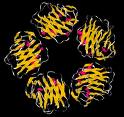CRP May Not Cause Heart Disease
 According to a new study high blood levels of C-reactive protein (CRP) do not increase the risk of heart disease and stroke. The protein CRP is a part of the body's inflammatory immune response and earlier studies had suggested that this protein could be linked to events that culminate in the formation of a blood clot, which can go on to cause a potentially deadly heart attack or stroke.
According to a new study high blood levels of C-reactive protein (CRP) do not increase the risk of heart disease and stroke. The protein CRP is a part of the body's inflammatory immune response and earlier studies had suggested that this protein could be linked to events that culminate in the formation of a blood clot, which can go on to cause a potentially deadly heart attack or stroke.
Dr. Borge G. Nordestgaard, a professor of genetic epidemiology at the University of Copenhagen and study author said, "The most likely explanation is that atherosclerosis that is not clinically manifested leads to increased CRP levels." Many drug companies are making drugs for CRP but Nordestgaard said, "There is nothing wrong with using CRP as a marker of higher risk for heart disease and stroke. We just say it is not causing the disease."
Genetics play an important part in CRP as some people are genetically programmed to have high levels of CRP, while others have genes giving them low levels of the protein. In the study the researchers performed genetic studies on more than 31,000 people, looking at four variant forms of the CRP genes. They found that people with certain CRP genes made 64% more CRP than people with the least active CRP genes.
They made a calculation that if CRP was responsible then people with the most active CRP genes should get up to 32% more heart disease and up to 25% more strokes. In the final analysis researchers compared people with heart disease or stroke and compared them with people who were disease free and they found that the people with the most active CRP genes were in way at a higher risk for the diseases than those with the least active CRP. Contrary to earlier belief that people whose genetic profile gave them high levels of CRP should have an increased incidence of ischemic diseases such as heart attack and stroke was found Nordestgaard said. "So, we cannot say that high CRP levels per se lead to ischemic vascular disease," he said.
Heribert Schunkert, MD, director of Germany's Luebeck University Hospital and professor of cardiology at the University of Leicester, England said, "It is pretty definitive. Genetic markers that increase CRP don't increase disease."
Thomas A. Pearson, MD, PhD, MPH, senior associate dean for clinical research at the University of Rochester Medical Center, led a recent study group that evaluated CRP research for the CDC and the American Heart Association. He said, "This is a nail in the coffin for the idea that CRP is a causal factor in heart disease. This is a very useful study, and cleverly done, and their conclusion is right on the money."
The study findings are published in the Oct. 30 issue of the New England Journal of Medicine.